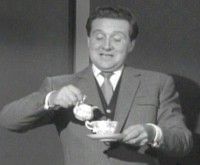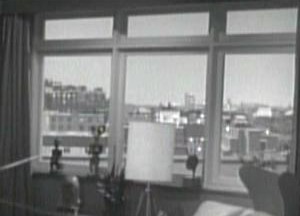|
Emma picked up the copy of Quite Quite Fantastic German and paged through it.
"Well, Steed, our first lesson consists of numbers and colors. The easiest things to learn in any language, I daresay."
Steed nodded.
"I'm ready, Mrs. Peel. Fire away."
"Well, let's add a little more to it, Steed. We may as well learn the names of some household items at the same time."
"You're ambitious, Mrs. Peel."
|
Der Zahlen - The Numbers
von ein bis Zwanzig zählen
1 - eins
2 - zwei
3 - drei
4 - fier
5 - fünf
6 - sechs
7 - sieben
8 - acht
9 - neun
10 - zehn
|
11 - elf
12 - zwölf
13 - dreizehn
14 - vierzehn
15 - fünfzehn
16 - sechzehn
17 - siebzehn
18 - achtzehn
19 - neunzehn
20 - zwanzig
|
|
"You've given me one month to become fluent in German, Steed. We don't have time to let the grass grow under our feet."
"True," said Steed, nodding with mock gravity. "True."
"So help yourself to another cup of tea. I shall start with the kitchen."
The Colors - Die Farben
black
blue
brown
green
grey
orange
purple
red
white
yellow
|
- schwarz
- blau
- braun
- grün
- grau
- orange
- purpurrot
- rot
- weiss
- gelb
|
|
 |
Steed stood up and poured himself a cup of tea. He then poured another cup for Emma, as she came from the kitchen carrying a tray piled high with various items.
"All right, Steed," said Emma, sipping her tea. "Shall we go on?"
"Certainly, Mrs. Peel," said Steed, eyeing the contents of the tray with pleasure.
"All right. First off, these items came from the kitchen. And the kitchen is called the...?"
|
Steed narrowed his eyes for a second, then snapped his fingers. "Küche. Die Küche, I should say. When we learn these words, Mrs. Peel, we need to make sure we learn the definite articles that go with them. Some words are masculine, some feminine, some neuter, and they all take the appropriate definite article."
Emma nodded. "Yes, understood." Then she said: "Die Küche,. That's easy to remember, as it's part of a famous phrase, isn't it? The lot of women in Nazi Germany. Kinder, Küche, und Kirche.
Steed nodded. "Children, Kitchen and Church."
Emma shook her head. "Actually that's been the lot of women practically everywhere until just recently," she said. "I'm so glad I was born in England in the latter half of the 20th century."
Steed grinned and leaned towards her. "I am as well, my dear."
Emma returned the grin, then broke eye contact and looked down at the tray. She picked up two small saucers. "So, we have eins küche," she said, "one kitchen, und, zwei untertasse.
"Untertasse," Steed repeated, "as in "under the cup. Tasse being cup."
"You are correct, sir." said Emma, placing her tasse on the untertasse.
"What's next?" said Steed, rubbing his hands together cheerfully. "I count...eins, zwei, drei pieces of cake."
"Kuchen," corrected Emma. "Cake is Kuchen. And a piece of cake is ein Stücke des Kuchens. I would have brought in biscuits but I couldn't find the word for that in the book."
| "Not to worry, Mrs. Peel. I'm sure biscuits are in there somewhere. Meantime, this ca...I mean, Kuchen, looks delicious." There was a pause. "Mmmmm, yes indeed."
There was another pause, for a longer time, as both of them enjoyed their cake and tea.
"Oh," said Mrs. Peel, as she looked up. Her eyes fell upon her windows. "Here I could have saved that Kuchen for later. I could have used the word Fenster, as in windows. For there are drei Fensters in this room.
"To Fensters, said Steed, saluting the windows with the last piece of his cake before popping it into his mouth.
| 
|
